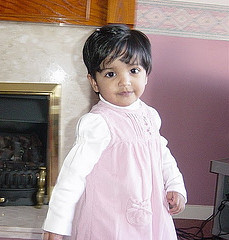Is your teenager grouchy? Does your little one have a cold? Research shows that kindness is a sure route to greater happiness and, in some cases, improved health. (See last week's posting, What You Get When You Give for more about this.)
Here are five ways to raise kinder kids:
- Model kindness yourself. Kindness can be contagious: when we see someone else perform an act of kindness, we are more likely to feel an impulse to help out, too. Research suggests that altruistic children have at least one parent (usually of the same sex) who deliberately communicates altruistic values to their kids. Similarly, when preschoolers have nurturing caregivers who deliberately model helping others, they tend to be more helpful and verbally sympathetic to other children when they hurt themselves. There are many ways to model altruism for your kids, as the Half Full reader shows:
"We have twin 4 year olds. Girls. We make a lot of art for people. Even just a drawing. We also make cookies or other baked goods for people. We're in the process of planning to do a bake-a-thon for a bake sale for Haiti and my girls are very excited for that. Right now it's little things but I hope to get them actually volunteering and holding lemonade sales at an early age."
- Make kids personally responsible in some way. Four to 13 year olds who were asked to donate their Halloween candy to hospitalized children donated more (and were more likely to make a donation) when they felt personally responsible. Researchers made kids feel responsible when they said things like: "I will be counting on you and you and you…I will put each of your names on the bag of candy I give tomorrow to the hospitalized children" rather than "please give them as many as you want by putting the candies in the box on the table."
- Don't reward helping behavior. Very young children who receive material rewards for helping others become less likely to help in the future compared with toddlers who only receive verbal praise or receive no reward at all. This research suggests that even the youngest children are intrinsically motivated to be kind, and that extrinsic rewards can undermine this tendency. One reader posted this comment in response to my last posting about kindness on the Huffington Post:
"Some of us feel happy helping others while some feel happy hurting others. I opine that it is the conditioning by our parents when we were young that have led different people to different paths. As a parent, we need to reward our kids when they do a good deed so that they become condition to help others."
What parents model conditions kids in ways that affect their behavior later (though I do have a hard time believing that anyone would feel true joy hurting another person). Although rewarding kids has been shown to backfire eventually, praising kids for helping others is a good idea if we use growth-mindset praise.
- Be positive. Parents who express positive feelings and use positive, non-coercive discipline raise children who are kinder and more compassionate toward others. Using the ERN method described in this posting is positive and non-coercive; yelling, spanking, and threatening is not.
- Expose them to need. Too often we protect our kids from pain and suffering, and in so doing we shelter them from others' needs. Consider the counterintuitive notion that compassion is a positive emotion strongly correlated with happiness, and provide them with opportunities to feel compassion. Teach kids that this compassion is a gift—it is a way to give their time, attention, and energy to another. Added bonus: When we expose kids to others' suffering, they often feel both compassion and gratitude.
I'll close with a reader's comment on my last post that provides a nice illustration of this link between kindness, compassion, and happiness:
"I run a program that helps people overcome the emotional after-effects of traumatic illness and injury. I have seen numerous examples of people changing their life direction after they began giving of themselves to others. It also made a difference for me after I went through life changes due to heart disease and cancer."
© 2010 Christine Carter, Ph.D.
References:
Martin L. Hoffman, "Altruistic Behavior and the Parent-Child Relationship," Journal of Personality and Social Psychology 31, no. 5 (1975).
Peterson, "Generativity and Successful Parenting: An Analysis of Young Adult Outcomes."
Marian Radke Yarrow, Phyllis M. Scott, and Carolyn Zahn Waxler, "Learning Concern for Others," Development Psychology 8, no. 2 (1973).
Nancy Eisenberg and Elizabeth Geisheker, "Content of Preachings and Power of the Model/Preacher: The Effect on Children Generosity," Developmental Psychology 15, no. 2 (1979).

Geoffrey Maruyama, Scott C. Fraser, and Norman Miller, "Personal Responsibility and Altruism in Children," Journal of Personality and Social Psychology 42, no. 4 (1982).
D.C. McClelland and C. Kirshnit, "The Effect of Motivational Arousal through Films on Salivary Immunoglobulin A," Psychology & Health 2, no. 1 (1988).
Felix Warneken and Michael Tomasello, "Extrinsic Rewards Undermine Altruisitic Tendencies in 20 Month-Olds," Development Psychology 44, no. 6 (2008).
Ariel Knafo and Robert Plomin, "Parental Discipline and Affection and Children's Prosocial Behavior: Genetic and Enviromental Links," Journal of Personality and Social Psychology 90, no. 1 (2006).
"Prosocial Behavior from Early to Middle Childhood Genetic and Environmental Influences on Stablility and Change," Development Psychology 42, no. 5 (2006).
Join the Campaign for 100,000 Happier Parents by signing this simple pledge.Become a fan of Raising Happiness on Facebook.
Follow Christine Carter on TwitterSubscribe to the Happiness Matters Podcast on iTunes.


Comments
Another fantastic post! I especially like #3, I think so many parents just intuitively reward “good” behavior and thereby take away a child’s intrinsic motivation, this is a great reminder about empowering children.
Kelly Coyle DiNorcia | 9:26 am, February 26, 2010 | Link
I think the only time anyone feels happiness at another’s misfortune (or as the commenter said “feel happy hurting others”) is when they’ve been raised in a particularly unhealthy environment. If kids are shown kindness, every single one of them will instinctively be happy helping others.
Wendy | 11:07 am, February 26, 2010 | Link
This, like all your posts, is extremely helpful. I have a question/comment, however, on #5. I have been resisting exposing my 4 year old to certain of our all-too-common realities these days, such as homeless, war and violence. It seems to me that there will be more than enough time for her to deal with these issues when she gets older. Similarly, many of these problems involve collective political decisions, and I’m not so sure that she could understand such complexity. Will I end up just scaring my daughter about huge groups of people “fighting” if she doesn’t understand why people go to war? I don’t want to go super pollyanna, but it just seems silly to introduce all the pain that American capitalism offers the world when she can’t even really wipe her own butt yet.
Ideas/advice on age-appropriateness vis a vis 5 would be helpful. Believe me, I want her to get out there in the streets with me, but I want it to be something she can understand. I don’t want her to feel overwhelmed by fear when she is simply too young to really know what she’s going to do about it
Justin | 7:56 pm, February 28, 2010 | Link
I really like #3.. great point.
——-
dada | 2:31 pm, March 2, 2010 | Link